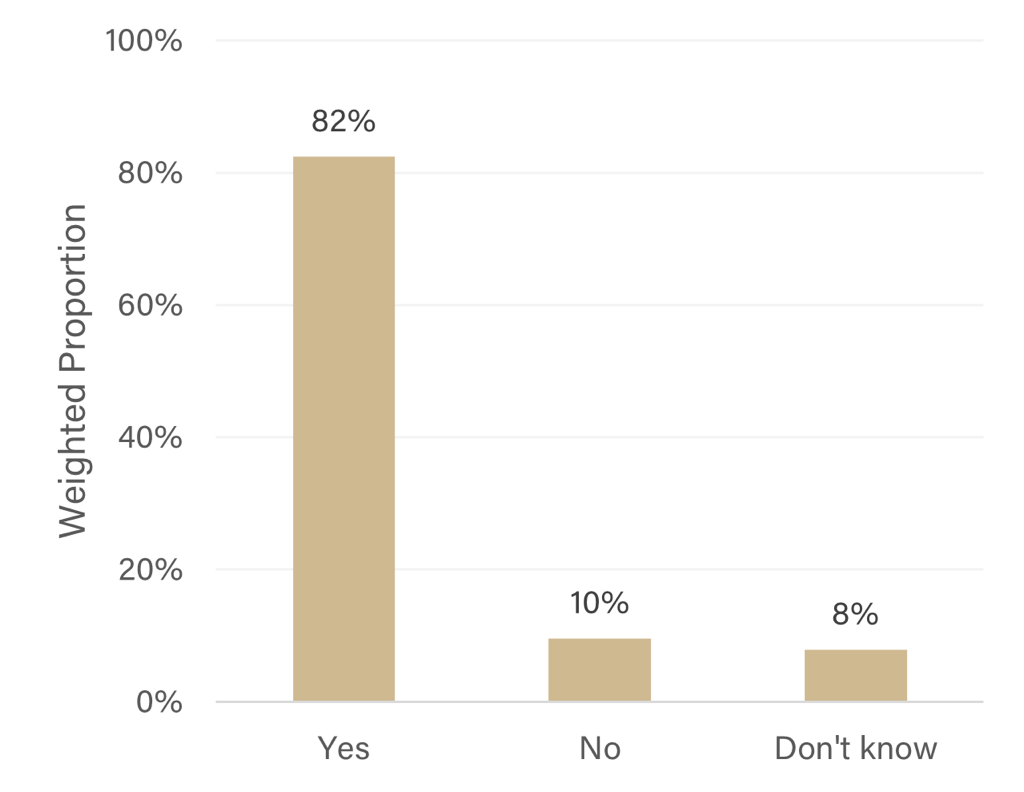As families across America plan their Thanksgiving gatherings for 2024, new survey data reveals a holiday defined more by connection than division. According to the October Consumer Food Insights Survey by Purdue University’s Center for Food Demand Analysis and Sustainability, an overwhelming 82% of Americans plan to celebrate Thanksgiving with a meal this year, demonstrating the holiday’s enduring significance in American life.
“Do you plan on celebrating Thanksgiving next month with a Thanksgiving meal?”
The ways Americans celebrate vary distinctly by region, painting a portrait of our nation’s diverse holiday traditions. Southern hospitality shows in the numbers: 38% of households are planning large gatherings of more than 10 people. Midwestern celebrations tend toward medium-size gatherings, with 39% hosting 6-10 people. Meanwhile, both coastal regions prefer more intimate settings, with about 40% of households in the West and Northeast planning gatherings of 1-5 people.
Celebrations often extend beyond a single meal: 44% of Americans plan to participate in multiple Thanksgiving gatherings. Whether hosting (31%), attending (36%), doing both (16%) or dining out (9%), Americans find various ways to connect over the holiday meal. This eagerness to gather suggests that, despite often-reported concerns about political divisions, Americans are choosing to prioritize togetherness during the holiday season.
In fact, contrary to popular media narratives about contentious family gatherings, the survey reveals that political discussions, while present at 40% of Thanksgiving celebrations, rarely dominate or disrupt the holiday spirit. Our data were collected in mid-October, just weeks before the election, as the national political fervor was coming to a head, yet most consumers have other priorities this holiday season. When asked about holiday stressors, politics ranked far below more practical concerns, such as cooking, grocery shopping and family dynamics. The data paints a picture of Americans more focused on sharing a meal than sharing political viewpoints.
Thinking about Thanksgiving this year, which of the following cause(s) you stress? Please select all that apply.
When political conversations do occur, they’re often less dramatic than social media and news media might lead us to expect. Our survey found that most people gather with relatively like-minded individuals, scoring an average of 6.05 on a 0-10 scale of political similarity. Perhaps this natural sorting explains why about one-third of respondents say political discussions don’t affect their enjoyment at all, and 31% report that these conversations actually enhance their Thanksgiving experience.
The overall stress level associated with the holiday remains moderate, averaging 4.34 on a 0-10 scale. Notably, gatherings without political discussions tend to report lower stress levels — scoring 0.86 points lower than those where political conversations are common, on average. However, the data suggests this stress difference might reflect broader family dynamics rather than politics alone.
Looking ahead, 73% of respondents expect this year’s celebrations to be similar to previous years in terms of stress levels. This stability, combined with the high participation rates, indicates that Thanksgiving continues to fulfill its traditional role as a time for coming together.
For the agricultural and food retail sectors, these findings reaffirm Thanksgiving’s position as a cornerstone of American food culture, largely transcending political divisions. For social scientists, the data offers a more nuanced understanding of how Americans navigate potentially complex family dynamics during holidays— suggesting that shared traditions and meals often bridge apparent political divides. Most Americans are focused on what truly matters during Thanksgiving: sharing food, maintaining connections and celebrating together, regardless of political viewpoints.




